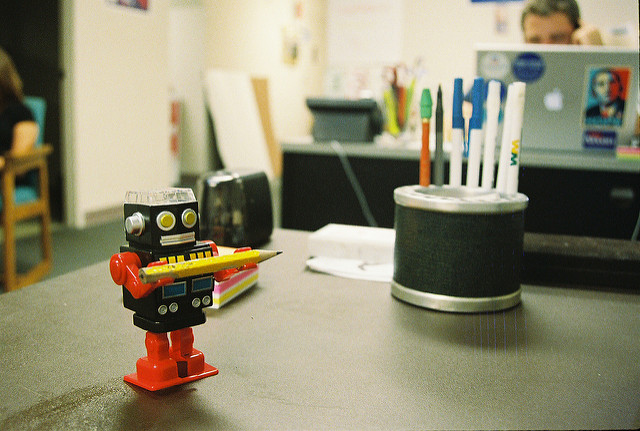

Legal Web Watch April 2017. Legal Web Watch is a free email service which complements the Internet Newsletter for Lawyers. To receive Legal Web Watch regularly sign up here.
I don't know about you, but I have had enough of "robot lawyers". It's not that I have anything against robots, it's that the term "robot lawyers" I feel demeans lawyers; not only that, it's unfair to robots. It's a term being used purely for media purposes; nobody seriously thinks in terms of "robot lawyers".
A robot is "a machine capable of carrying out a complex series of actions automatically, especially one programmable by a computer", not one that exercises their learning, experience and professional judgement to resolve an issue.
We are all, at least from the TV ads, familiar with robots that can spray paint a car or vacuum the living room carpet and it's easy to imagine robots doing ever more complex tasks in the factory, in the warehouse, on the road and in the home, but when it comes to aping the thinking of sentient professional beings I think we need to be more circumspect in our terminology.
I'm more comfortable with the portmanteau term "chatbot": "a computer program designed to simulate conversation with human users, especially over the internet". Chatbots use natural language processing and machine learning to understand questions asked and then decide from their rulebooks which answers to give and which output to generate, and that's generally the application of our so-called robot lawyers.
So what does "the world's first robot lawyer" do? Why it challenges parking tickets and demands flight delay compensation. And Robot Lawyer LISA writes non-disclosure agreements. These are not abstruse areas of law; they are very narrow in scope. The innovation is not that these "robots" are aping lawyers but that they are providing ways to resolve relatively straightforward legal issues in a more accessible way, using advances in technology. I applaud that, but it's nothing new; we've been making progress on it for many years.
That's not to say I don't recognise the rapid progress being made with artificial intelligence, but even in the field of Big Law, AI is achieving success in relatively narrow and specific applications, like M&A due diligence.
There are tougher nuts to crack. The fact is, it's much easier to program a "robot" to dispute a traffic ticket or do due diligence than it is to get them to tie a shoe lace [FT, paywalled].
For the lowdown on AI and robots in law, follow Joanna Goodman.
Nick Holmes is Editor of the Internet Newsletter for Lawyers and Legal Web Watch. Follow him on Twitter @nickholmes.
Image adapted from Tabletop Assistant cc by Matthew Hurst on Flickr.
One thought on “Legal Web Watch April 2017: Robots and the law”
Comments are closed.